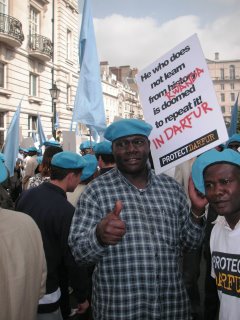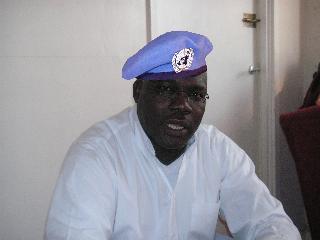Darfur sun
This week brought a clear path forward for the Darfur conflict and humanitarian crisis. The UN Security Council’s confrontational approach was dealt a near fatal blow and the Secretary-General’s Special Representative for Sudan Jan Pronk outlined a five step solution for Darfur and suggested a compromise solution of a Chapter VIII approach.
At a press conference following his
Security Council appearance, Pronk suggestion that using the UN Charter’s Chapter VIII to support the African Union (AU) deployment in Darfur was a viable option.
“Chapter VIII is a possibility,” Pronk said, “whereby there is another force (which acts) on behalf of the United Nations which has been requested by the
Security Council and fully financed by the UN.”
He stressed that AMIS, the AU force, could continue to be led by the AU with AU peacekeepers, and that he believed the Government of Sudan was willing to accept this solution. Pronk, however, stressed the caveat that the force must be more effective than if it is now.
Contrary to the continued calls by some governments for the UN to act unilaterally against Sudan, AU Commission Chairperson Alpha Konare was quoted in the Sudan Tribune as contradicting this view.
“That means this has to be done with the Sudanese government’s approval and we have clearly said that even if the UN was to come, the bulk of the troops would be AU forces, the command would be African and the AU political leadership will be there,” Konare said, after the AU extended presence of its Darfur units until the end of the year.
He also contradicted certain members of the
Security Council, which have consistently placed the blame solely on the Government of Sudan. According to Konare, the current instability in Darfur is more the direct result of fighting between the rebel movements themselves than between the rebels and the Government of Sudan.
As discussed in last week’s article, Darfur Crisis: Shared Responsibility (Sudan Tribune Comments 18 September 2006) the primary solution is the restoration of the Darfur Peace Agreement (DPA). Pronk, in supporting that position, outlined a five step program to get the DPA into “intensive care” before it dies.
The first step is to “get everyone on board.”
“Abdul Wahid’s group,” Pronk said, explaining one of the core problems of the DPA, “are out of the agreement and we need to bring them on board.”
This is vital to the DPA because Abdul Wahid’s group, which mostly represents Furs, is a significant portion of the population. He stressed that Abdul Wahid’s group maintained the original ceasefire and has not resumed fighting and that peace will not be possible without their cooperation.
He concluded the description of the first step by stating bluntly, “they must be brought on board.”
Pronk called for establishing a truce as the second step. He stressed that the approach used at the peace talks caused the rebel movements to split into different, uncontrollable factions.
“They were told: First sign, then talk. That further split the rebel movements,” he reported to the
Security Council. According to Pronk, this led the National Redemption Front to break the ceasefire in July and contribute to the current escalating events in Darfur.
He stressed it was “an outright violation of the DPA”, and that a truce was needed to bring the DPA out of its coma. Pronk said, “Mini Minawi can play a role, maybe, in mediating between his present and his former allies in order to finally get peace on the ground.”
Reforming the non-functioning Ceasefire Commission (CFC) was identified as the third step.
“It simply does not function,” Pronk said. “It has been hijacked by the signatories, it is not well chaired, non-signatories have been excluded, and the United Nations has been silenced.”
He urged the CFC to start addressing the violations of the DPA. In addition, he envisions a renewed and authoritative CFC that is fully representative of all parties.
“In the southern Sudan,” he recalled, “the CJMC is one of the most important pillars of the CPA. If it were taken out, the CPA would be paralyzed. That is exactly the present state of the DPA, so the third condition is to start addressing the violations of the DPA through a renewed, fully representative, but authoritative CFC.”
The SRSG called for improving the DPA as the fourth step. According to Pronk, many people of Darfur have lost faith in the DPA and a new round of consultations should be started.
“We must talk, add, improve and give an opportunity to those who feel excluded and form at least one third of the population of Darfur. We must get their interests guaranteed, on paper as well as in reality,” he said, stressing that the new talks can not be seen as reopening the peace negotiations.
Finally, Pronk called for all parties to get off the collision course of confrontation and work on rebuilding trust and respect.
“
Secretary-General Kofi Anan has clearly said that “without the consent of the Sudanese Government, the transition will not be possible”, reported Pronk, directly contradicting the position of unilateral action. “However, getting the consent of the Government requires consultations. A transition to a United Nations force has to be made attractive to the Sudanese leadership in order to get its support. That also requires trust, confidence-building and time. It requires that those in favor of a transition and those against it should refrain from the present collision course.”
Clearly, SRSG Pronk recognizes by stressing his last point that the hostile rhetoric by certain members of the
Security Council has continued the crisis in Darfur and raises suspicions by the Government of Sudan. Once again--as this author stated after the DPA was signed, in July, and now--the quickest solution to the Darfur humanitarian crisis is a robust AU peacekeeping force.
This is the ideal time for the Government of National Unity to demonstrate to the world that this was not a war of Arabs against non-Arabs. This is the time for the Government of National Unity to work closely with SRSG Pronk and initiate his five step program. It is time for the Government of National Unity to demonstrate that Africans—North Africans and Sub-Saharan Africans, regardless of their ethnic or religious background--will solve African issues, without outside political rhetoric.
The Great Lakes Centre for Strategic Studies is a London-based think tank, with offices in Central and East Africa. Ilham Kocache may be reached at
Ilham.kocache@glcss.org 
